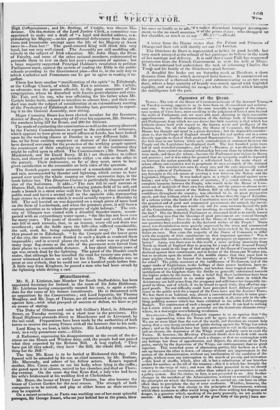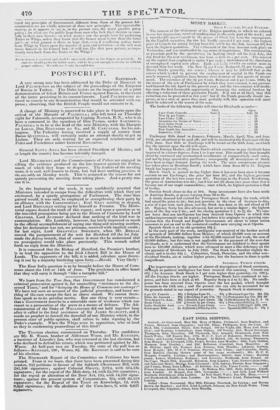Opiniansi of tbe TimEs—The vote of the House of Commons
iu favour of the Assessed Taxes,.. on Tuesday evening, appears to us to have been an ill-considered and unfortu- nate vote. So was the decision of the same assembly in support of the iniqui- tous system of Corn-laws, most revolting to the judgment of honest men beyond the walls of Parliament, and, we must add, most alarming to their reasonable apprehensions. Another demonstration of the feelings both of Government and Parliament, from which we can derive but little comfort, is that which has hitherto shown itself with regard to the known waste and profligacy of the Pension-list. On all these subjects, the House of Commons the Reformed House, has thought and acted in a given direction ; but the deplorable consider- ation is, that thePeople of England should have telt and spoken out in a sense directly opposite to that of their professed Representatives. It is not, of course, the first time in our history- when such contradiction of sentiment between the People and the Legislature has displayed itself. The last hundred years were full of such wretched examples; and why ?—Because, as was always then in- sisted on, there existed no natural relationship between those by whom the laws were made, and those for whom—because the Parliament was vicious in theory and practice • and it was taken for granted that no sympathy could be depended on between the nation generally and a self-elected body, the main object of whose efforts and existence was to perpetuate its own monopoly of the national plunder. The mischief was seen by every eye, and the cure universally called for was a reform of Parliament. That Reform was anticipated by all men of any foresight as the sole means of averting a war between the Nation and the Legislative Oligarchy. It was looked upon as a single safeguard against revo- lution ; and why P—Because it must of necessity, if a sound rein, to, establish complete harmony between the People, who would make the House of Com- mons out of materials of their own free choice, and the parties tai chosen to re- present them. The success of the Reform Bill in effecting- such concord and confidence throughout the country, was admitted to be its great prospective merit, and that without which it would be no better than the cup of Tantalus. If a reform within the limits of the Constitution were to fail of accomplishing the practical end of good and economical government, the natural, the inevit- able inference was, that men would cry out for some measure beyond the pale of the Constitution,—namely, for one involving its overthrow. Now, what is the fact ? Has the ReformedParliament so demeaned itself as to satisfy honest and reflecting men that the blessings of good government arc seemed through its instrumentality ? Have the votes of the House of Commons on many seri- ous questions been conforinable to the declared wishes of the People? There never was dissatisfaction more gravely expressed by the town and commercial population of the country than that which has been excited by the protecting duties on corn. How came the majority of the House of Commons to differ with the majority of their constituents on that important question ? Was it that honourable members desired indirectly to propagate an eagerness for revo- lution? Again, was there ever in this world a more striking unanimity from North to South of England than in praying for a repeal of the Assessed Taxes..? Then what could be the hope of that majority of the House of Commons which declared against their constituents' and in favour of the House and Window tax, but to inculcate upon the minds of the middle classes that they must look to some mighty change far beyond the boundary of a "Reformed" Parliament for'relief? The public murmurs at the indifference of Parliament, 'and of the upper ranks of Englishmen, to the feelings of their poorer brethren, have re- cently grown to a frightful magnitude, and betoken some tragical result. The institutions of the kingdom share the dislike so generally entertained towards the higher orders by the lower, from a belief that those institutions have been framed and administered in an unfair spirit. The bad odour in which the Aristocracy are held arises from the arrogance and selfishness too frequently im- puted to them' and of which, if we be bound to speak truly, they afford no nig- gard proofs. No real difficulty could have prevented Lord Althorp's acquies- cence in the public wish for a repeal of the Corn-laws and the Assessed Taxes. We fear there is an habitual, nay, almost a conventional distaste in scone quar- ters, to appreciate the national desires, or to concede at all, save only in the nib- bling peddling manner which has been exhibited in the noble Lord's unhappy Budget. The continuance of such a temper will not do. It can lead to nothing but a crisis which must end, so powerful are the democratic elements every- where, in a downright overwhelming revolution.
STANDARD—The Morning Chronicle imputes to us an opinion that "the time is approaching when the Tories will be again lords of the 'ascendant." We are no more bliad than the rest of the world, and therefore we cannot help seeing that a very strong revulsion of public feeling againft the Whigs has taken place ; and as the Radicals have but little pretension to rule in the ascendancy, and no chance, the depression of the Whigs would probably serve to exalt the
Tories. If, however, the Morning Chronicle thinks that we look with much impatience to the consummation of such a change, or that we contemplate with any feelings but those of apprehension and disgust, the elevation of the Tory party, merely by the depression of the Whigs, our contemporary does us great injustice. This wretched game of alternating parties, like buckets in a well, one up because the other is down--of change without any improvement in the
system of the Administration, without any amelioration of the condition of the people, without even any interruption to the march of poverty and innovation —this kind of shuffle which, after all, is but a substitution of one breeches pocket for another, at time till of the treasury—this it is which has brought the country to the veige of ruin ; and were the choice presented to us, we should say at once—welconie revolution, rather than submit to a perseverance in such a paltry system. But the choice, in fact, is not presented to us. Any further • changu..s in the members of the Administration, without an essential change in the principles on which the Government is to be carried on, can have no other effect than to precipitate the day of utter confusion. Whether, however,_ the Tory party is ripe for that change in the principles of Government, without which their accession to office would bring upon them nothing but disgrace and danger, is a question which, speaking of the party generally, we are unable to answer. If i , ndeed, they (we speak of the great body of the party) have ma-
tured any principles of Government, different from those of the present Ad- I ministration we are wholly ignorant of those new principles. This inscrutable secrecy, as it appears to us, is, in the present case, the worst possible party policy ; for what can the public hope from men who lock their designs so care- fully in their own breasts-or what motive can the people have for preferring Tories to Whigs, unless they know that the former mean better than the latter act ?-or what ground is there to hope that, even if a suffering nation turns from Whigs to 'Ion-s upon the impulse of pain and irritation-as the sick man tosses himself in his fevered bed-it will not, like that poor patient, as impa- tiently turn back from the Tories to the Whigs?

















 Previous page
Previous page